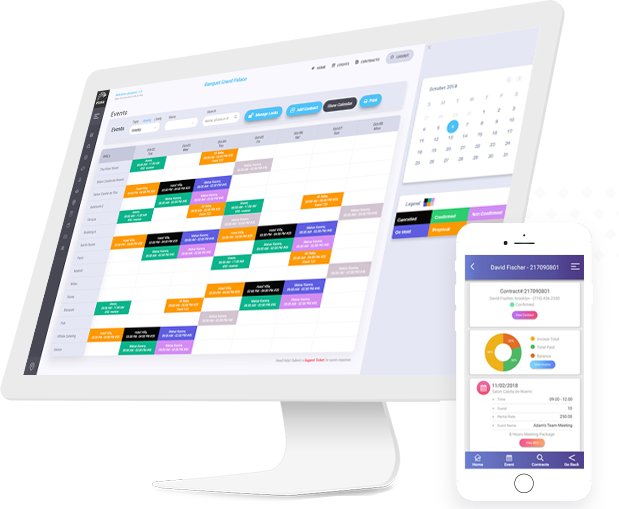Mobile app development has become a cornerstone of the digital age, shaping how we interact with technology and transforming various aspects of our lives. From social networking and entertainment to productivity and e-commerce, mobile apps have revolutionized the way we access information, communicate, and conduct business on the go.
In recent years, the demand for mobile apps has skyrocketed, driven by the widespread adoption of smartphones and tablets. As a result, businesses, entrepreneurs, and individuals alike are increasingly turning to mobile app development to reach their target audience, enhance user engagement, and stay competitive in today's fast-paced digital landscape.
Mobile app development involves the creation of software applications specifically designed to run on mobile devices, such as smartphones and tablets. These apps can be developed for various platforms, including iOS (Apple), Android (Google), and sometimes even for cross-platform compatibility.
Mobile app development frameworks have revolutionized the way developers build apps, offering a range of tools and resources to streamline the development process. In this blog, we delve into some of the most popular mobile app development frameworks that every app developer should be familiar with.
1. React Native:
React Native has emerged as a leading cross-platform framework for building native mobile apps using JavaScript and React. With its reusable components and efficient development workflow, React Native allows developers to create high-performance apps for iOS and Android platforms simultaneously. We explore the key features of React Native and its advantages for app developers.
JavaScript and React-based: React Native leverages JavaScript, a widely-used programming language, and React, a popular JavaScript library for building user interfaces. This combination allows developers to use their existing JavaScript skills and knowledge of React to develop mobile applications.
Cross-Platform Development: One of the standout features of React Native is its ability to facilitate cross-platform development. Developers can write code once and deploy it on both iOS and Android platforms, significantly reducing development time and effort. This cross-platform capability is made possible by React Native's underlying architecture, which translates React components into native platform components.
Reusable Components: React Native promotes the concept of reusable components, where UI elements can be encapsulated into modular components that can be reused across different parts of the application or even in different projects. This modular approach not only enhances code reusability but also improves the maintainability and scalability of the codebase.
Efficient Development Workflow: React Native offers an efficient development workflow that enables rapid iteration and testing. Developers can use tools like hot reloading, which allows them to see the changes they make to the code reflected instantly on the emulator or physical device without the need to rebuild the entire application. This feature speeds up the development process and enhances productivity.
Native Performance: Despite being a cross-platform framework, React Native is designed to deliver native-like performance. It achieves this by rendering components using native APIs, resulting in smooth animations, fluid user interactions, and fast load times. React Native also provides access to platform-specific APIs and native modules, allowing developers to integrate platform-specific functionality seamlessly into their apps.
Large Developer Community: React Native benefits from a vibrant and active developer community, which contributes to its ongoing development, maintenance, and support. The community provides a wealth of resources, including documentation, tutorials, third-party libraries, and open-source projects, making it easier for developers to get started with React Native and solve common challenges.
2. Flutter:
Flutter, developed by Google, is another cross-platform framework gaining traction among developers for its fast development cycle and expressive UI. Using the Dart programming language, Flutter enables developers to create visually stunning apps with a single codebase while offering hot reload for instant code changes. We discuss the benefits of Flutter and its growing community support.
Single Codebase: Flutter allows developers to write code once and deploy it on multiple platforms, including iOS, Android, web, and desktop. This single codebase approach streamlines the development process, reduces maintenance overhead, and ensures consistency across different platforms.
Fast Development Cycle: Flutter offers a hot reload feature, which enables developers to see the effects of code changes instantly on the emulator or physical device without restarting the app. This rapid iteration cycle speeds up the development process, improves productivity, and facilitates quick experimentation with UI designs and features.
Expressive UI: With Flutter, developers can create visually stunning and highly customizable user interfaces using a rich set of built-in widgets and powerful styling capabilities. Flutter's flexible UI framework allows for pixel-perfect designs, smooth animations, and intricate interactions, enabling developers to craft engaging and intuitive user experiences.
Performance: Flutter is known for its excellent performance, thanks to its architecture and rendering engine. Flutter apps are compiled directly into native machine code, which results in fast startup times, smooth animations, and consistent performance across different devices and platforms. Additionally, Flutter's layered architecture minimizes the bridge between the app and the platform, reducing overhead and enhancing performance.
Growing Community Support: Flutter has a rapidly growing community of developers, enthusiasts, and contributors who actively participate in its development, share knowledge, create plugins, and contribute to open-source projects. This thriving community provides a wealth of resources, including documentation, tutorials, forums, and third-party packages, making it easier for developers to learn Flutter, solve problems, and collaborate on projects.
Platform Integration: Flutter offers seamless integration with platform-specific features and APIs, allowing developers to access device functionalities like camera, location, sensors, and storage. Flutter's comprehensive plugin system provides access to a wide range of native and third-party plugins, enabling developers to extend the capabilities of their apps and integrate with popular services and libraries.
Support for Material Design and Cupertino Widgets: Flutter includes sets of widgets that implement Material Design (for Android) and Cupertino (for iOS) design languages, ensuring that apps look and feel native on each platform. Developers can leverage these widgets to create visually consistent and platform-specific UIs with ease.
3. Xamarin:
Xamarin, now a part of Microsoft's .NET ecosystem, empowers developers to build native iOS, Android, and Windows apps using C# and .NET. With its shared codebase and native performance, Xamarin simplifies the development process and allows for seamless integration with platform-specific features. We examine the advantages of Xamarin for developers targeting multiple platforms.
Single Codebase: With Xamarin, developers can write code once in C# and share it across multiple platforms, including iOS, Android, and Windows. This shared codebase approach streamlines development, reduces duplication of effort, and ensures consistency across different platforms.
Native Performance: Xamarin allows developers to build native mobile apps using native UI components and platform-specific APIs. This results in apps that deliver native-like performance, with fast startup times, smooth animations, and responsive user interfaces.
Access to Native APIs: Xamarin provides access to platform-specific APIs and features, allowing developers to integrate native functionalities such as camera, location, sensors, and push notifications into their apps. This enables developers to create rich, feature-rich experiences that leverage the full capabilities of the underlying platforms.
Native User Interfaces: Xamarin enables developers to create platform-specific user interfaces using Xamarin.Forms for shared UI logic and Xamarin.iOS and Xamarin.Android for platform-specific UI customization. This allows developers to tailor the user experience to each platform while still sharing a significant portion of the codebase.
Integration with Visual Studio: Xamarin integrates seamlessly with Visual Studio, Microsoft's popular integrated development environment (IDE). Developers can leverage familiar tools and workflows, including debugging, profiling, and testing, to build, deploy, and manage Xamarin apps efficiently.
Strong Community and Ecosystem: Xamarin benefits from a strong community of developers, enthusiasts, and contributors who actively contribute to its development, share knowledge, and create plugins and libraries. This vibrant ecosystem provides a wealth of resources, including documentation, tutorials, forums, and third-party packages, making it easier for developers to learn Xamarin, solve problems, and accelerate development.
Microsoft Support and Tools: As part of Microsoft's ecosystem, Xamarin receives strong support from Microsoft, including regular updates, bug fixes, and new features. Developers also have access to a range of Microsoft tools and services, such as Azure Mobile Apps, Visual Studio App Center, and Xamarin Test Cloud, which facilitate app development, testing, and deployment.
4. Ionic:
Ionic is a popular framework for building hybrid mobile apps using web technologies such as HTML, CSS, and JavaScript. Leveraging web standards and Cordova plugins, Ionic offers a rapid development environment and cross-platform compatibility, making it ideal for building lightweight apps and prototypes. We explore the versatility of Ionic and its extensive plugin ecosystem.
Cross-Platform Development: Ionic is a popular framework for building hybrid mobile apps using web technologies such as HTML, CSS, and JavaScript. It allows developers to write code once and deploy it across multiple platforms, including iOS, Android, and the web. This cross-platform capability streamlines the development process and reduces the need to maintain separate codebases for each platform.
Rapid Development Environment: Ionic provides a rapid development environment with a rich set of pre-built UI components, themes, and templates. Developers can leverage these components to quickly prototype and build mobile apps with minimal effort. Ionic also offers features like live reload, which allows developers to see changes instantly during development without having to rebuild the entire app.
Web Standards and Technologies: Ionic is built on web standards and technologies like HTML, CSS, and JavaScript, making it accessible to a wide range of developers, including those with web development experience. Developers can use their existing skills and knowledge to build mobile apps with Ionic, reducing the learning curve and accelerating development.
Native-Like User Experience: Despite being a hybrid framework, Ionic apps can deliver a native-like user experience thanks to its UI components and platform-specific design guidelines. Ionic's UI components are optimized for performance and appearance on both iOS and Android platforms, ensuring that apps look and feel native to users.
Extensive Plugin Ecosystem: Ionic offers an extensive plugin ecosystem with a wide range of plugins and extensions that extend the functionality of the framework. Developers can easily integrate native device features such as camera, geolocation, push notifications, and more into their Ionic apps using these plugins, enhancing the app's capabilities and user experience.
Community and Support: Ionic benefits from a large and active community of developers, enthusiasts, and contributors who actively contribute to its development, share knowledge, and provide support. The community provides a wealth of resources, including documentation, tutorials, forums, and third-party plugins, making it easier for developers to learn Ionic, solve problems, and accelerate development.
Versatility: Ionic is versatile and can be used to build a wide range of mobile apps, from simple prototypes to complex enterprise applications. Whether developers are building consumer-facing apps, internal tools, or enterprise solutions, Ionic provides the flexibility and scalability to meet their needs.
5. NativeScript:
NativeScript allows developers to build truly native mobile apps for iOS and Android using JavaScript or TypeScript. By leveraging native APIs and UI components, NativeScript ensures optimal performance and user experience, while enabling code sharing between web and mobile projects. We discuss the advantages of NativeScript for developers seeking native app development without compromising productivity.
NativeScript offers several advantages for mobile app development, including true native performance, cross-platform development, access to native APIs, code sharing with web projects, flexible UI development, a vibrant community and ecosystem, and being open source and free. These features make NativeScript a compelling choice for developers looking to build high-performance native mobile apps with JavaScript or TypeScript.
Mobile app development frameworks play a crucial role in simplifying the app development process and empowering developers to create innovative mobile experiences. Whether it's React Native, Flutter, Xamarin, Ionic, or NativeScript, each framework offers unique features and benefits for building cross-platform or native apps. By familiarizing themselves with these frameworks, app developers can enhance their skills and accelerate the development of cutting-edge mobile applications.
Veuz Concepts stands out among the top mobile app developers, offering expertise in leading frameworks. With a commitment to innovation and quality, we tailor solutions to meet your unique needs. If you're seeking reliable mobile app development services, look no further. Contact Veuz Concepts today, and let's bring your app idea to life with excellence and expertise.









.jpg )







Leave a comment